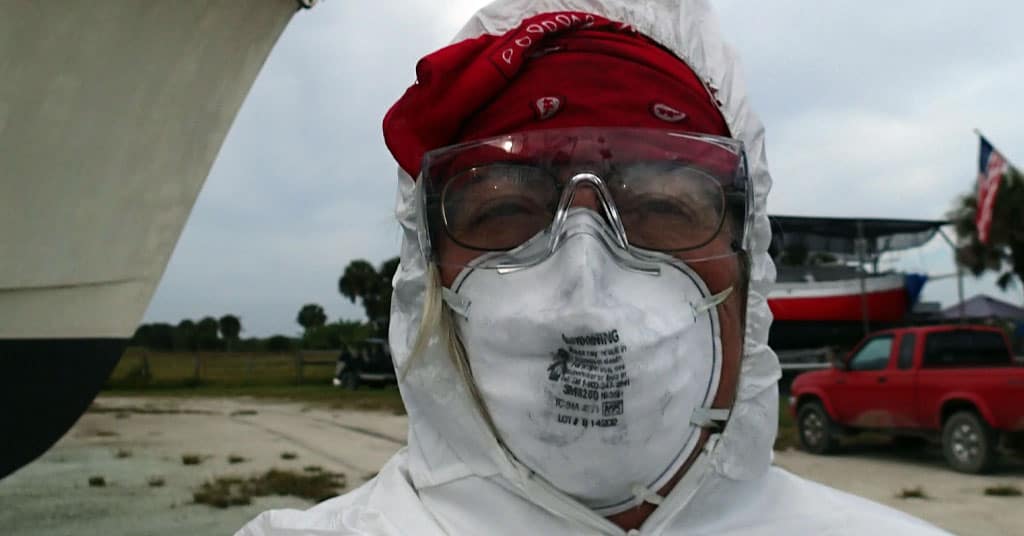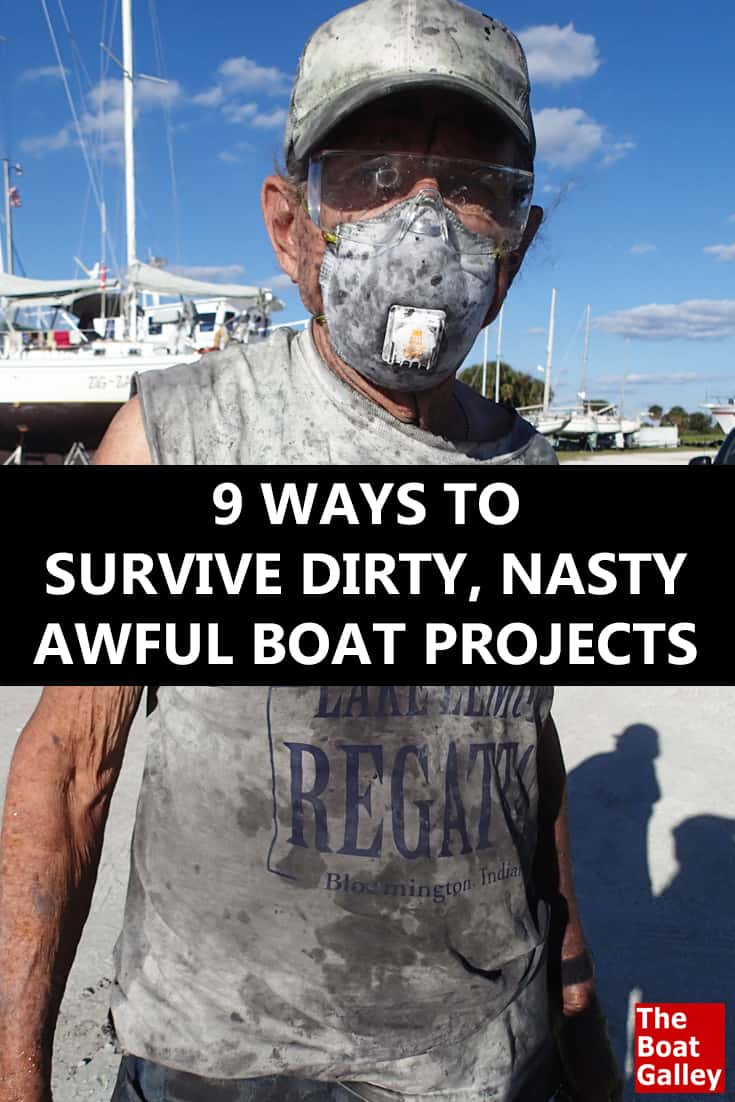Wondering how to survive dirty boat projects on your to-do list? We have some suggestions after removing our old bottom paint. It was a dirty, nasty, horrible job. Your project might be scraping paint from the underside of your catamaran hulls. Repowering. Patching holes in fiberglass. Recovering from sinking (yes, this happened to friends). I’m sure there are others.
Here are my best tips for surviving multi-day, dirty boat projects.
Set a Quitting Time
Decide in advance when to quit work and start cleaning up. And be realistic about how long it will take to clean yourself and the boat. For us, it was 5 o’clock. That gave us time to take the dog for a short walk around the yard (and to stretch our limbs). We also put things away. We were showered before 6:30, able to return to the boat to avoid mosquitoes. And we had time for a beer and a moment to relax before fixing dinner.
Put Shower Gear and Clean Clothing in a Clean, Outside Spot
We had a car. So I put my cleanup stuff in the car to avoid a trip into the boat when I’m at my dirtiest. When we haven’t had the car, I’ve just put everything into a bag and found a place to put it.
Keep Work Clothes in a Bag
During our bottom scraping job, our work clothes were absolutely filthy, with bits of flaking bottom paint all over. I didn’t want them near anything else. We both put ours in an old plastic grocery bag as soon as we take them off in the shower room. This makes a huge difference in keeping the mess out of the boat. Even after switching to wearing Tyvek coveralls (Amazon), our work clothes still got filthy.
Cover Settees with Old Sheets or Towels
When we came aboard for lunch and a bit of a break, we’re pretty dirty. But we didn’t want to take the time to take a shower. I had a couple of old sheets that I threw over the settees so we didn’t transfer our mess to them when we sat down. At the end of the day, when we’re “clean” again, I took them up and keep them in a plastic bag.
Keep Meals Simple
After a day of hard physical labor, you don’t feel like cooking. Or at least I don’t. We ate cereal for breakfast, sandwiches for lunch, and one-pan skillet meals for dinner. We didn’t want to grill since we’d have to quit earlier to avoid the mosquitoes. Single-serving containers of applesauce and fruit are great as healthy snacks that take no prep. Salsa and chips are our usual quitting time snack with a beer – again, virtually no prep.
Take Care of Minor Injuries
It’s important to keep cuts and such clean and apply antibiotic ointment on them so you don’t get infections. We did this every day after our showers and again in the morning before we started work for the day. Cover cuts with antibiotic ointment and Band-Aids to keep it in place. Read a great tip another cruiser gave me about how to keep Band-Aids on.
Wear Old Glasses
If you wear glasses and you’re doing a really nasty project with paint, epoxy, or chemicals, you don’t want to wear your “good” glasses. Stuff is just too likely to get on them or possibly scratch them. Wear your backup pair. If you normally wear contacts, it’s a good idea not to wear them when doing projects like this. If anything gets into your eyes, contacts will only make it that much worse. Of course, also wear good eye protection – even with glasses and goggles, I still get a few pieces of crud in my eyes every day.
Use a Soft Nail Brush
We found that a soft nail brush in the shower is invaluable for scrubbing down our whole body, not just nails. We got these from Amazon for other things, discovered they were really too soft to be good as small scrub brushes, but perfect for scrubbing skin. We each ended up taking one for the shower.
Try Trekr Wash Cloths
The sister product to the Lunatec Scrubber dish cloths (Amazon) that I like so much, these have just enough coarseness to get my face and the rest of my body clean after using the brush. And it rinses totally clean very easily (it’s made of a soft plastic that’s very comfortable on your skin). Get them on Amazon.
Other Cruisers Recommend
Every cruiser has experience with dirty boat projects. Here are a few suggestions from our readers you might find helpful too.
Susie suggests booking a few nights in a hotel with a pool, if you can afford it. Relaxing away from the boat can make a whole project go more easily. They also invested in washable coveralls (Amazon) instead of the disposable Tyvek ones.
Tim V recommends UVEX Genesis safety glasses (Amazon) with prescription inserts. The tinted ones make excellent sunglasses as well. When the lenses or frames get damaged just replace them for a few bucks and continue to reuse the inserts.
Joyce recommends advance preparation to make clean-up easier. Apply a light coating of baby oil to skin and wrap hair in a bandana. Medical gloves keep hands clean too. Nina also suggests wearing sea boots. They’re easy to clean up after the work is done.
Got other tips for surviving these really nasty projects? Nothing’s going to make them fun, but little things go a long way in making things tolerable. Leave a note with what you do!
Related Posts

Carolyn Shearlock has lived aboard full-time for 17 years, splitting her time between a Tayana 37 monohull and a Gemini 105 catamaran. She’s cruised over 14,000 miles, from Pacific Mexico and Central America to Florida and the Bahamas, gaining firsthand experience with the joys and challenges of life on the water.
Through The Boat Galley, Carolyn has helped thousands of people explore, prepare for, and enjoy life afloat. She shares her expertise as an instructor at Cruisers University, in leading boating publications, and through her bestselling book, The Boat Galley Cookbook. She is passionate about helping others embark on their liveaboard journey—making life on the water simpler, safer, and more enjoyable.


The Boat Galley says
Oh yeah, definitely firming up the arms!
Bliss says
Husband & I just got a pair. Duh. Why did I not think of this before!!
Carolyn Shearlock says
Might help but I’m not sure I could get it smooth enough to really see through.
Carolyn Shearlock says
Hi Jim and welcome! Yeah, we’re big fans of Krud Kutter. Actually bought 3 GALLONS to clean the exterior after the summer in storage. Current job is scraping all the bottom paint off without harming the gelcoat, as we have no blisters and want to keep it that way. 🙂
The Boat Galley says
Yes to both. You can keep paint brushes and rollers in plastic bags for a few days in the refrigerator, so you don’t have to clean up so much — or waste so much paint. https://theboatgalley.com/saving-paint-rollers-brushes/